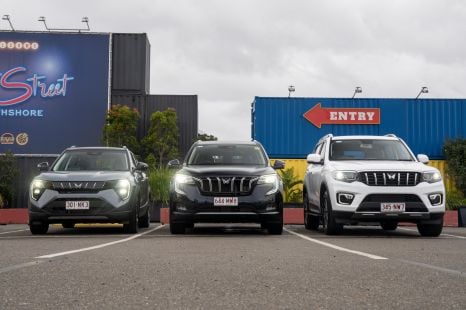

CarExpert.com.au
Model range deep-dive: Mahindra's SUV family
4 Days Ago
The Mercedes-Benz EQE SUV feels like a proper, almost old-school luxury car to drive, even if it looks like a science experiment.
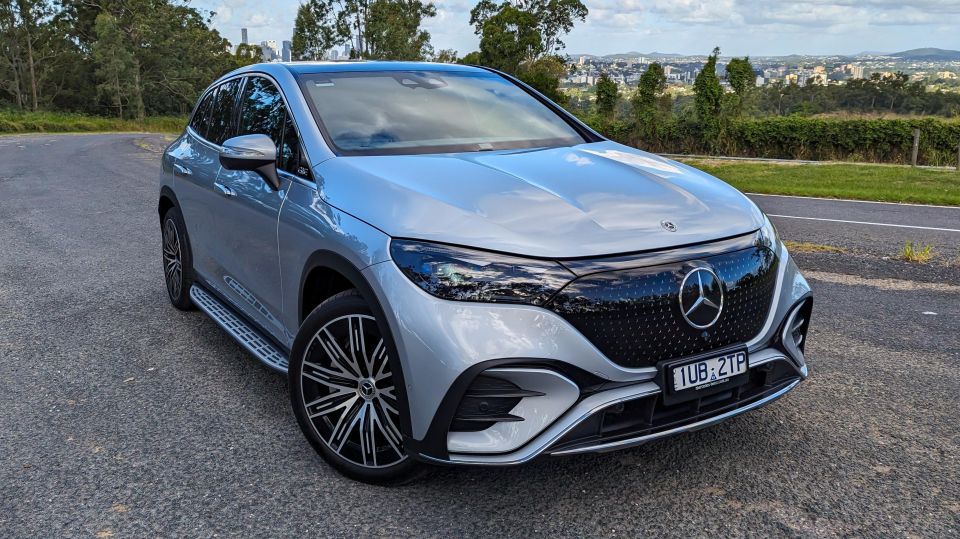
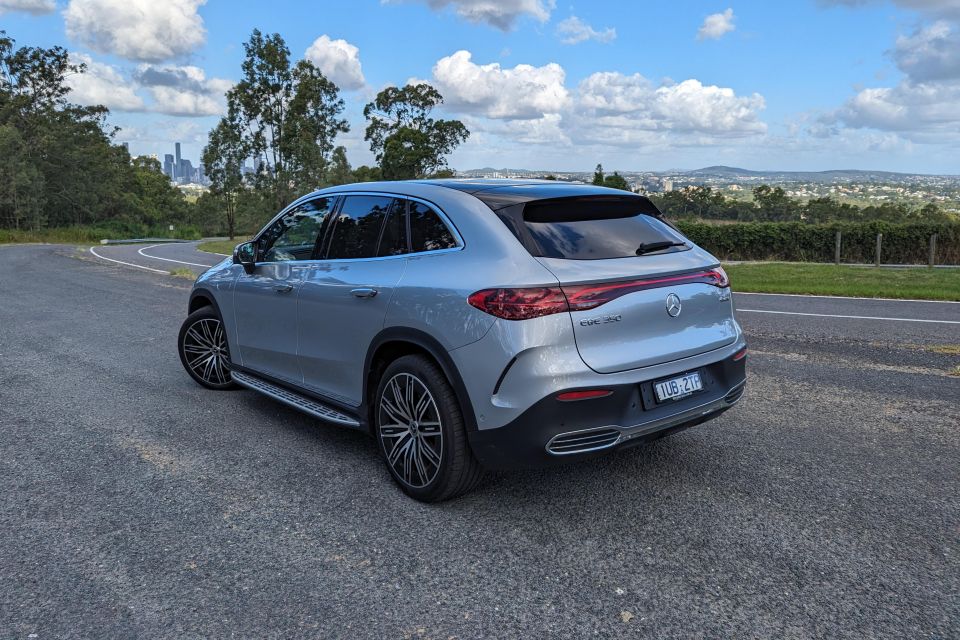

Quickly see how this car stacks up against its competition. Select any benchmark to see more details.
Where expert car reviews meet expert car buying – CarExpert gives you trusted advice, personalised service and real savings on your next new car.
It wasn’t that long ago now that if you wanted a premium electric vehicle (EV), Tesla was your only game in town.

That’s all changed now. The luxury establishment has rolled out electric models, and more recently premium-branded vehicles on dedicated EV platforms have started to appear, like this Mercedes-Benz EQE SUV. Tesla has also cleared some space, withdrawing its Model S and Model X to focus on more affordable vehicles.
Mercedes-Benz’s first EV in Australia was the EQC, heavily based on the previous GLC. But over the past couple of years, the three-pointed star brand has been busily rolling out a range of vehicles on its dedicated Electric Vehicle Architecture.
First came the EQS Sedan, followed by the EQE Sedan, but more recently Mercedes-Benz has launched the two EVA-based vehicles that will likely do larger volumes: the EQE SUV and EQS SUV.
Good luck telling them apart. Even more so than Mercedes-Benz’s combustion-powered models, which often follow a nesting doll design strategy, the EQE SUV and EQS SUV appear indistinguishable at a glance.
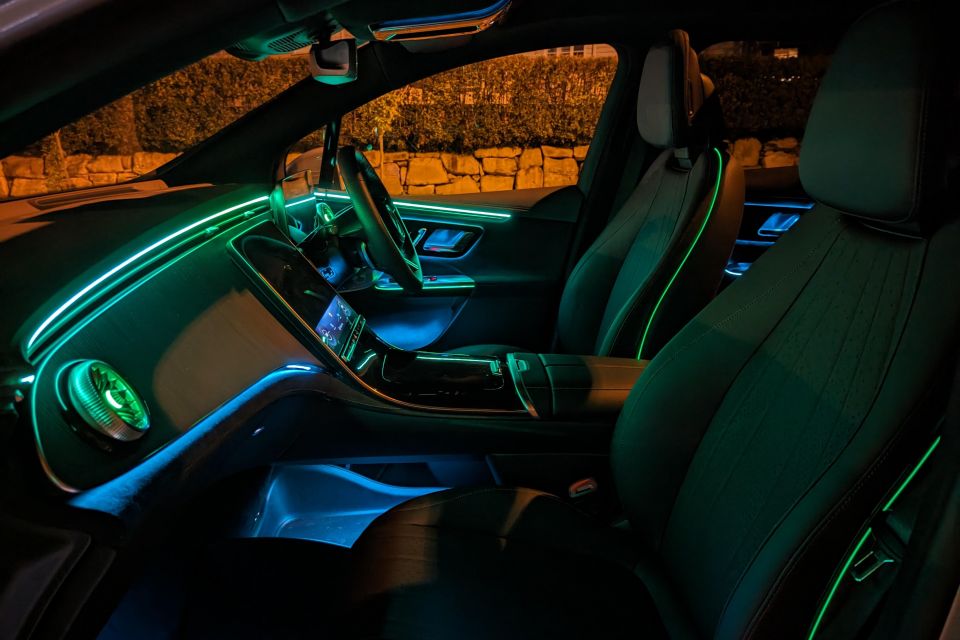
Styling is subjective, but I have to say the Mercedes-Benz EQE SUV is one ugly vehicle. And unfortunately, it’s not something that could be easily fixed with a facelift, as its shape and proportions are just… off.
In fact, I couldn’t find a single person who genuinely liked the exterior styling. Mercedes-Benz was clearly chasing efficiency gains with this ultra-aerodynamic styling – and indeed the EQE SUV has a slippery drag coefficient of 0.25 – but the company went way too far in that direction.
All EQE SUVs sold in Australia come with the AMG Line package, which includes some particularly gauche side steps that are rather pointless unless you’re very short with petite feet. The crossover only has 192mm of ground clearance, so it’s not like you’re climbing up into a LandCruiser here.
Don’t judge a book by its cover, though. Once you get behind the wheel, things brighten up considerably for the EQE SUV.
The EQE 350 SUV is priced identically to a diesel-powered GLE 300d, so this is one example of an EV not commanding a massive premium over a comparable combustion-powered vehicle.
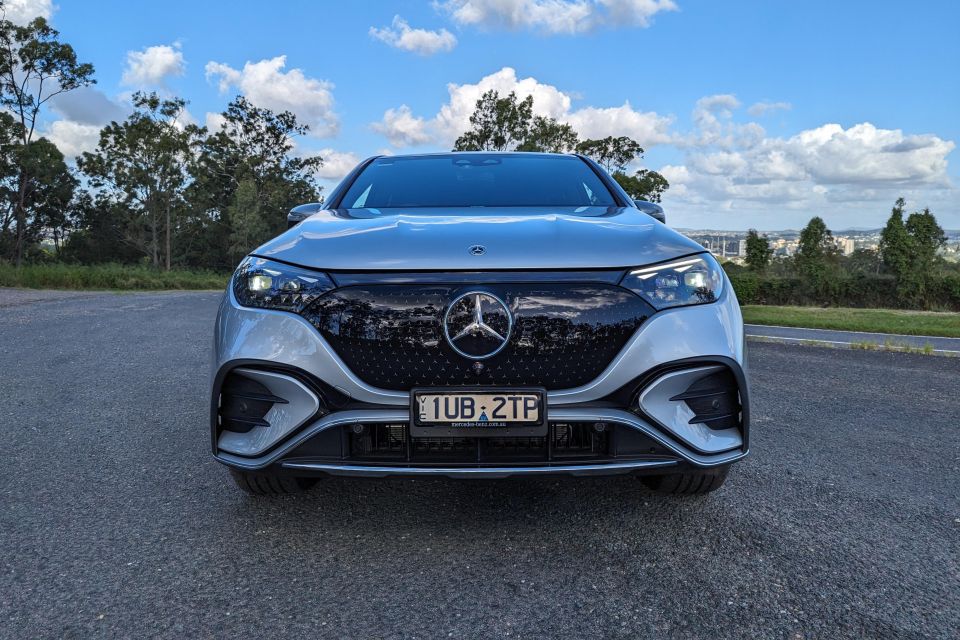
It’s worth noting that as Mercedes-Benz has moved to an agency sales model in Australia, it employs fixed prices. You won’t be able to haggle anything off the sticker as you may be able to with, say, an Audi Q8 e-tron or BMW iX.
2024 Mercedes-Benz EQE SUV pricing:
Prices exclude on-road costs
To see how the EQE SUV lines up against its rivals, check out our comparison tool.
The EQE SUV may take Mercedes-Benz’s new exterior design language to its extreme, but inside it’s a little more familiar.
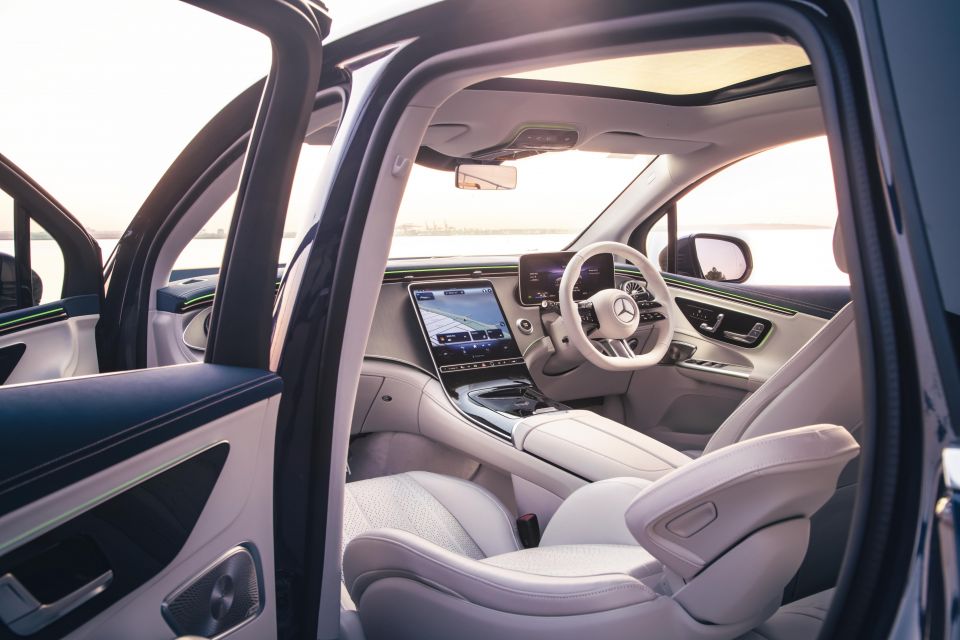
That means it has Mercedes-Benz’s ultra-modern interior design language, with a large, portrait-oriented infotainment touchscreen, a free-standing digital instrument cluster, and a sea of gloss black trim.
There’s also the brand’s distinctive ambient lighting, which allows you to select multiple colours at once, with light streaming out from the dashboard, doors, footwells, and even from the sides of the seats. The pastel-fantastic Miami Rose is my favourite of the pre-set themes.
The light also streams out of the turbine-style air vents on the dashboard, which bookend a dashboard that’s effectively one huge expanse of subtle, striated wood trim. You can also opt for wood trim to be used on the centre console, which would be a welcome relief from the smudge-prone gloss black trim.
The doors close with a solid thunk, but all is not perfect in terms of build quality or material choices.
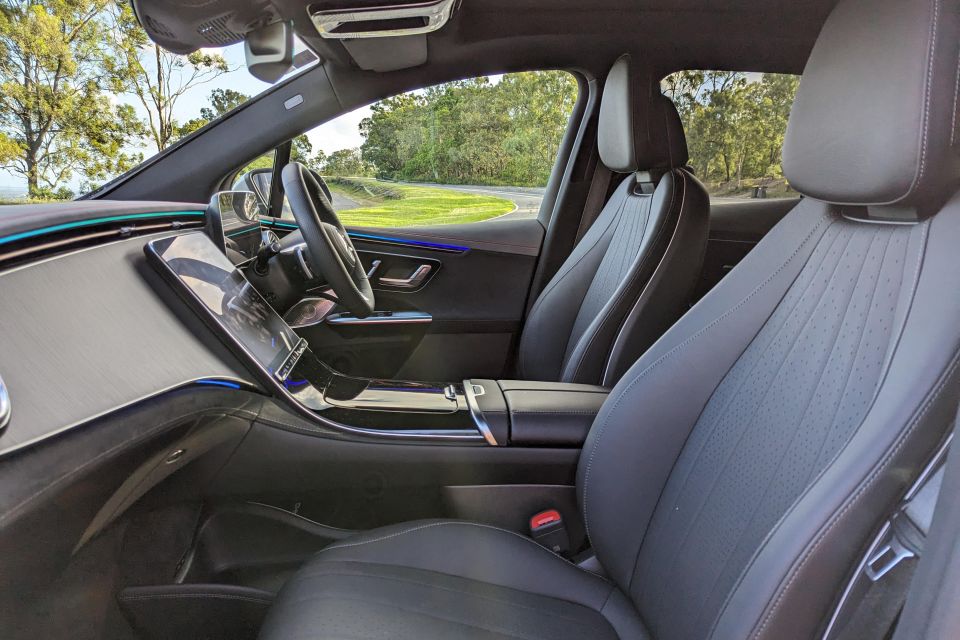
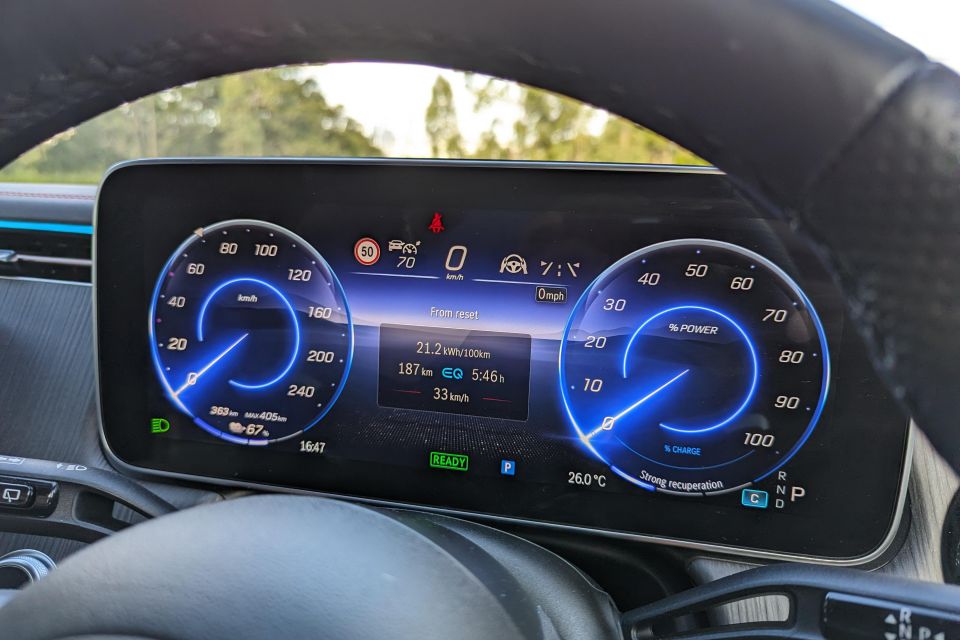
The button to open the centre console bin, for example, has a cheap feel and sound to it. Hard plastic is used for the lower halves of the doors, even though slightly rubberised plastic can be found on the front seatbacks. Mercedes has also applied smudge-prone gloss black trim to the steering wheel – i.e. the thing in the car you touch the most.
The column stalks also don’t feel as nicely damped as I would expect for a luxury vehicle. And while I’m moaning about column stalks, who at Mercedes-Benz thought it would be a good idea to make the gear shifter feel like an indicator stalk and position it where an indicator stalk would be in a typical vehicle?
For what’s supposed to be a black interior, which has the potential to be drab, the EQE SUV’s cabin is full of interesting trim choices. There’s the sheer expanse of wood, as well as suede and unusual but appealing leather-like material on the dash and doors. Of course, if you want even more contrast, a Neva Grey/Biscay Blue interior is a no-cost option.
The digital instrument cluster with its thick bezel looks somewhat dated, but the graphics are anything but. As other German brands do, Mercedes-Benz offers a full-screen map view for the cluster which is quite detailed, while there are other selectable themes.
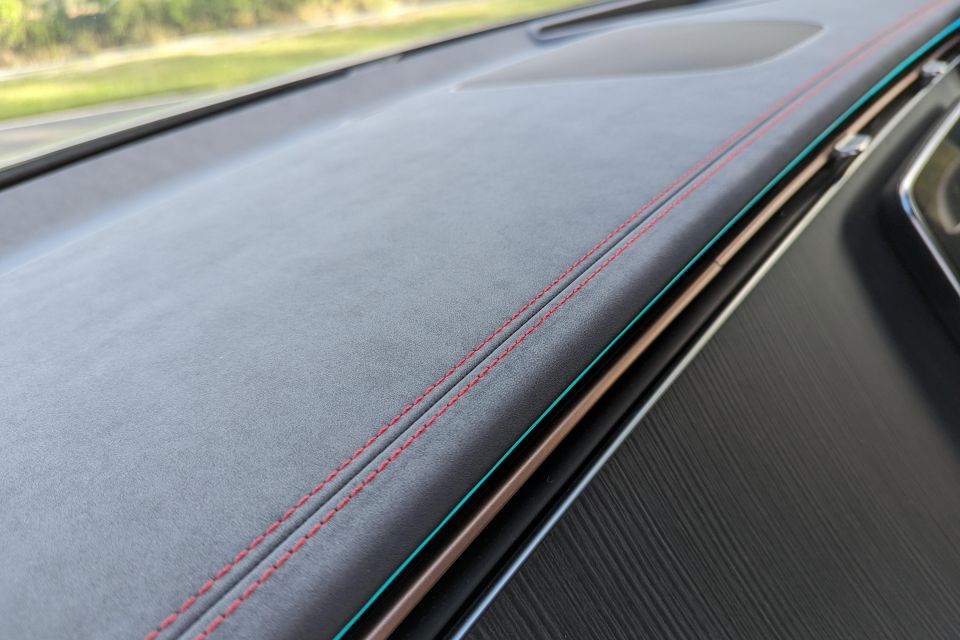
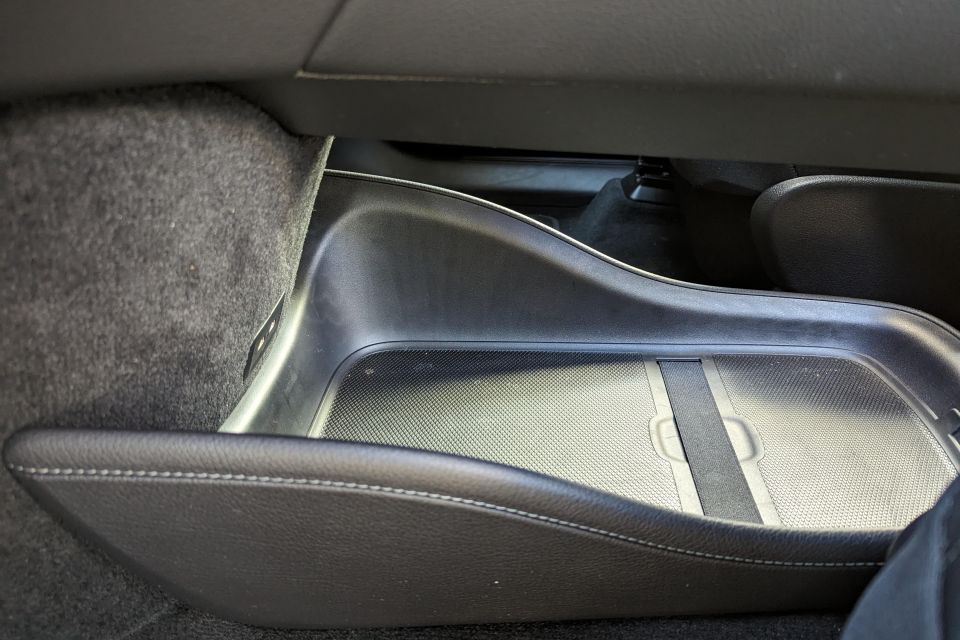
Navigating is a breeze in the EQE SUV because not only are there detailed, attractive maps on the touchscreen and instrument cluster, there’s a high level of detail for the maps that appear in the head-up display.
Using the embedded navigation, instead of Apple CarPlay or Android Auto, also allows you to take advantage of a clever augmented reality function that overlays footage of the road ahead with arrows.
The infotainment system overall is easily navigable, and the presence of haptic feedback when you press it is a clever touch – pun intended.
Android Auto and Apple CarPlay take up much of the screen, and can be easily returned to via a shortcut button in the top right, but an array of on-screen climate control buttons are always visible.
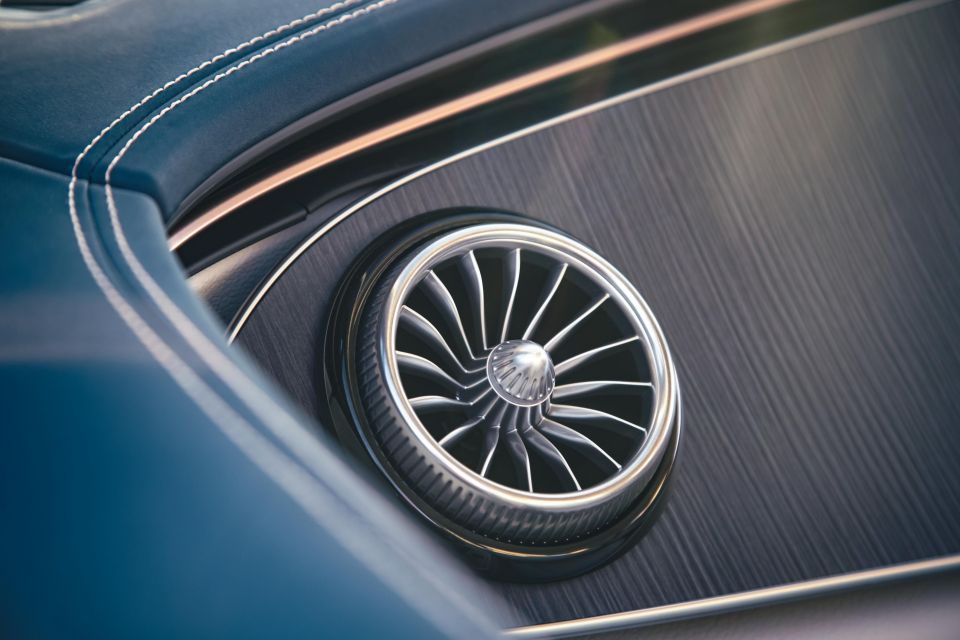
Below the screen is a row of physical buttons for functions like volume control, the surround-view camera, the settings menu, and the hazard lights.
The voice assistant could be smarter. Unusually, while saying “I’m cold” will get it to adjust the cabin temperature, as in many vehicles from rival luxury brands, I was rebuffed when I asked it to open the sunroof. It was also set off a couple of times for no apparent reason.
It’s a bit disappointing that a luxury car this price doesn’t have ventilated seats or a massaging function.
There’s an unusual function that moves to the front seats that sees them move slightly in different ways while you’re on the move, ostensibly to reduce fatigue and improve long-distance comfort, but every passenger I had promptly turned it off. The seats are more than comfortable that this feature doesn’t seem necessary.
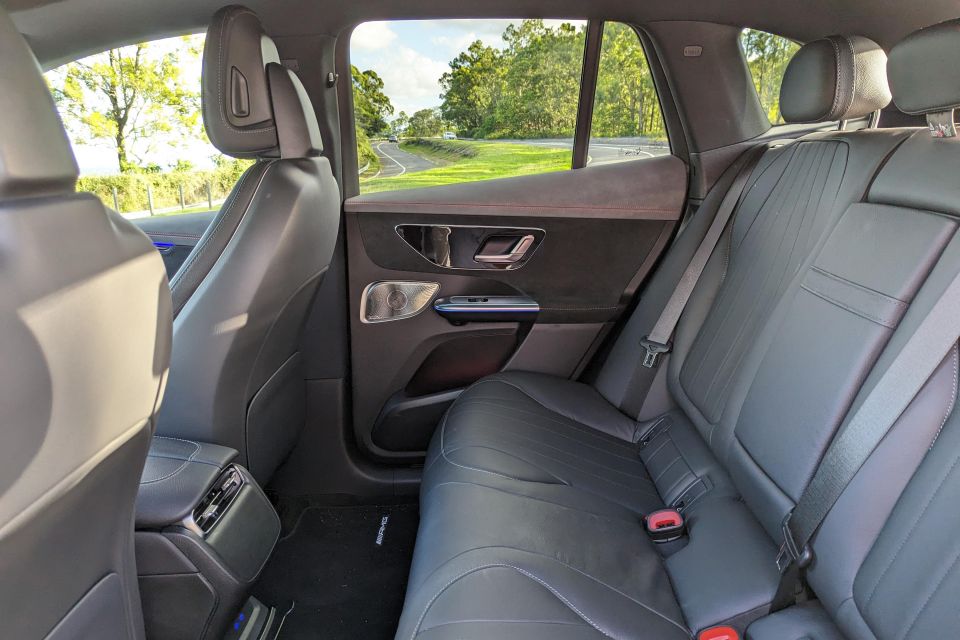
Up front, there’s a deep centre console bin with two USB-C outlets, plus a large shelf at the base of the centre console with additional USB-C outlets. There’s no shortage of places to plug in your phone.
Step into the second row and you’ll find a comfortable bench and a flat floor. That expansive panoramic roof bathes the cabin in light, and there are two USB-C outlets hidden behind a flap, plus map pockets, air vents, and a fold-down armrest.
Press the end of the armrest once and there’s a slit, and press that again and a pair of cupholders pop out.
There are three top-tether and two ISOFIX anchor points for child seats, and the rear bench folds 40/20/40.
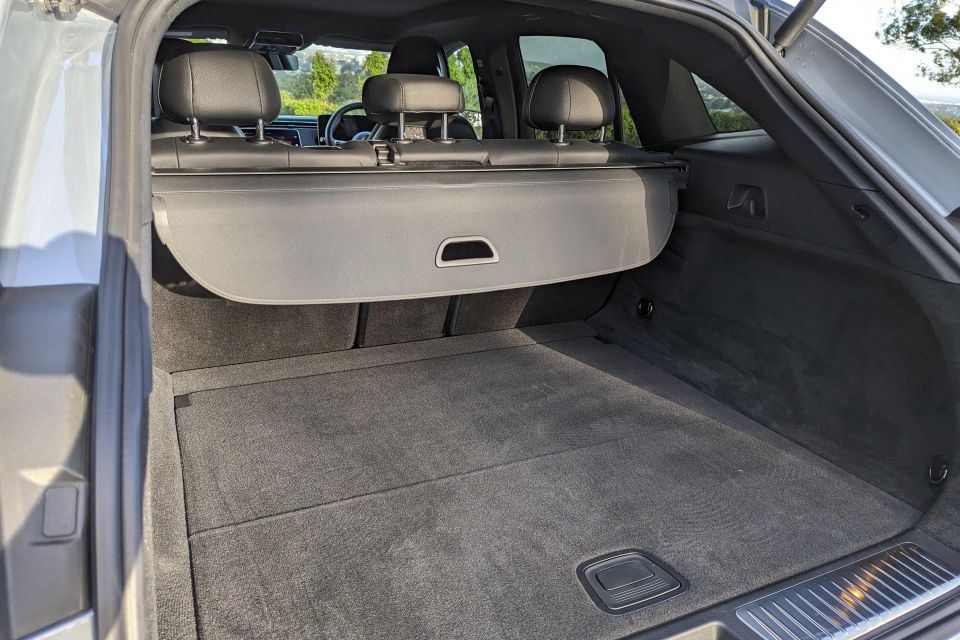
One strange omission in this interior: there are no grab handles above any of the windows.
There’s 520L of boot space, expanding to 1675L with the rear seats folded. You won’t find a spare wheel back here but there is underfloor storage for charging cables and the like.
The 350 sits in the middle of the EQE SUV lineup in Australia, above the single-motor rear-wheel drive EQE 300 and the more performance-oriented dual-motor all-wheel drive AMG EQE 53 SUV.

The nameplate launched with an additional variant – the EQE 500 SUV – which has since been withdrawn.
| Model | EQE 350 SUV |
|---|---|
| Drivetrain | Dual-motor electric drive |
| System power | 215kW |
| System torque | 765Nm |
| Driven wheels | All-wheel drive |
| 0-100km/h | 6.3 seconds |
| Battery | 89kWh lithium-ion |
| Claimed range | 436km (WLTP) |
| Energy consumption (claimed) | 18.9kWh/100km (ADR 81/02) |
| Energy consumption (as tested) | 19.6kWh/100km (highway, urban loop) 21.6kWh/100km (weekly figure) |
| Charging capacity (DC) | 170kW |
| Weight | 2678kg (tare) |
There’s an almost old-school Benz feel to this ultra-modern EV. It feels heavy, solid and purposeful on the road.
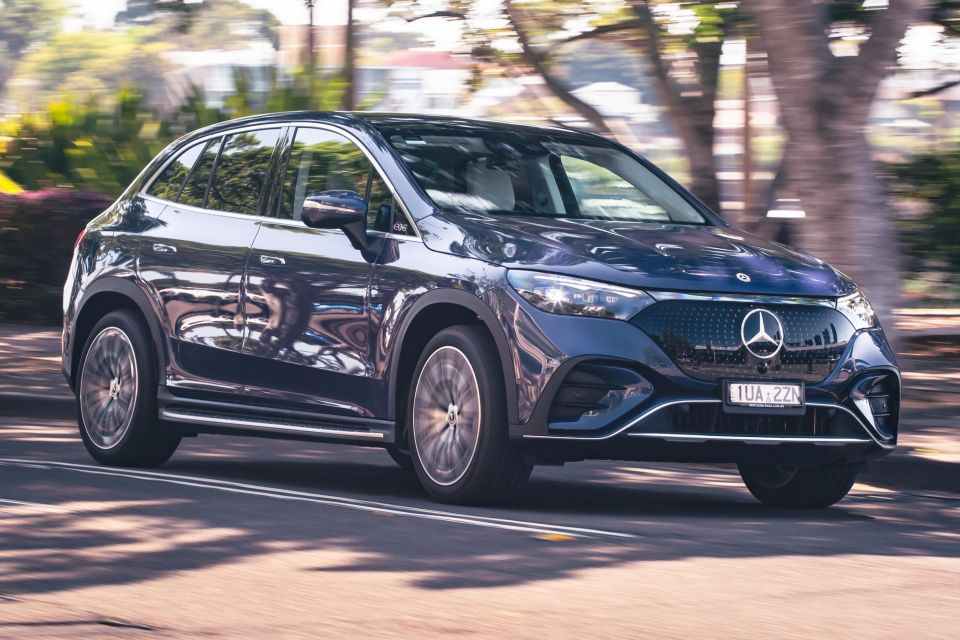
Ride comfort is also sublime. You can ignore all the AMG Line accoutrements, because there’s nothing remotely sporty about this – and that’s no bad thing.
Can you hustle it around a corner? Sure, though you’ll find there’s noticeable body roll and hear a bit of tyre squeal. Wet weather meant no spirited mountain run during my week with the EQE SUV, but my urban driving impressions led me to believe this wouldn’t be the best pick for corner-carving.
Why? Because this 2678kg (tare) electric SUV is a cruiser not a bruiser. But that doesn’t mean it’s a wallowing mess, as while there’s a soft suspension tune, body control is generally quite good and the EQE SUV feels tied down… if very, very heavy.
We did notice the EQE SUV bob occasionally on the highway, however.
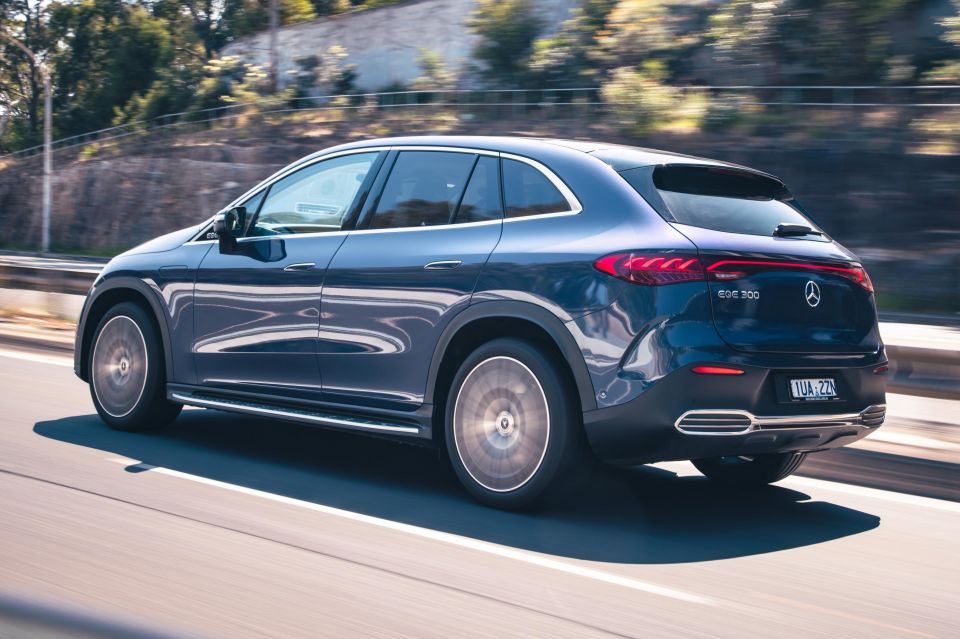
Air suspension is optional for an extra $2614, but – even though I haven’t driven an EQE SUV so equipped – it feels scarcely necessary.
Isolation is excellent, with bumps and ruts absorbed capably. The cabin is also whisper quiet, with excellent insulation from the outside world.
You can choose between two ‘Sound Experience’ options: Vivid Flux and Silver Waves. The former is a bit try-hard, but the latter has an almost intoxicating sound that everyone I drove around thoroughly enjoyed.
It sounds low, throaty and deep when you’re accelerating, similar to a large-displacement, combustion-powered engine, rising to an increasingly futuristic crescendo before dying off once you reach cruising speed. Then, it’s a return to blissful silence.
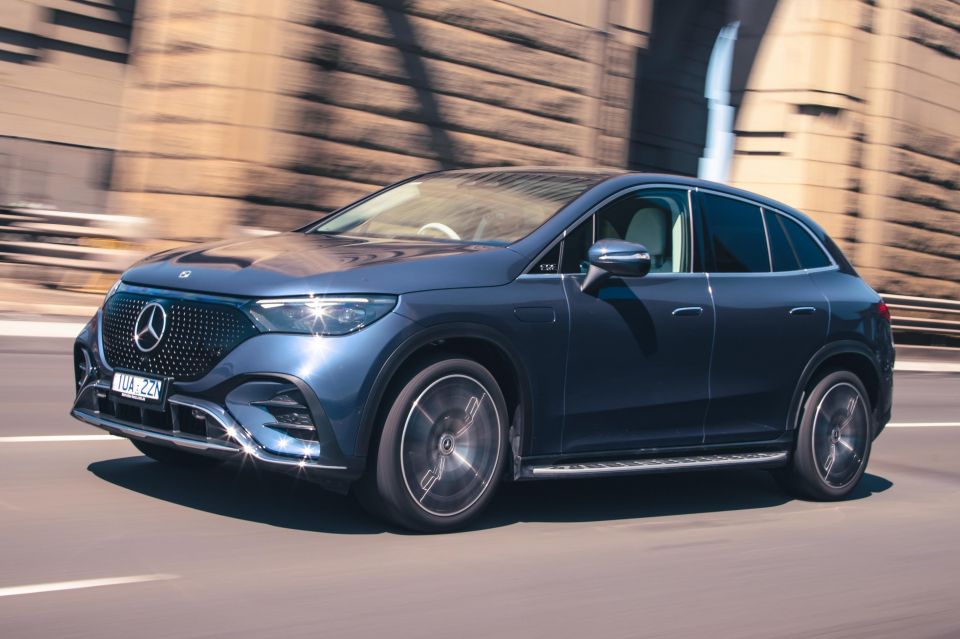
Where expert car reviews meet expert car buying – CarExpert gives you trusted advice, personalised service and real savings on your next new car.
The exterior Sound Experience is odd. The car continues to make weird, vaguely futuristic sounds after you turn it off and before you lock it.
6.3 seconds to 100km/h is hardly slow, but the EQE 350 SUV doesn’t push you back in your seat like some EVs do. But that’s hardly the point of this plush SUV, is it?
Instead, power delivery is smooth and effortless, and the EQE SUV never feels overwhelmed by the stout 765Nm of torque on tap – and neither do you.
The steering has a nice, progressive feel and solid weighting to it, but the brakes don’t feel up to the task of stopping this vehicle.
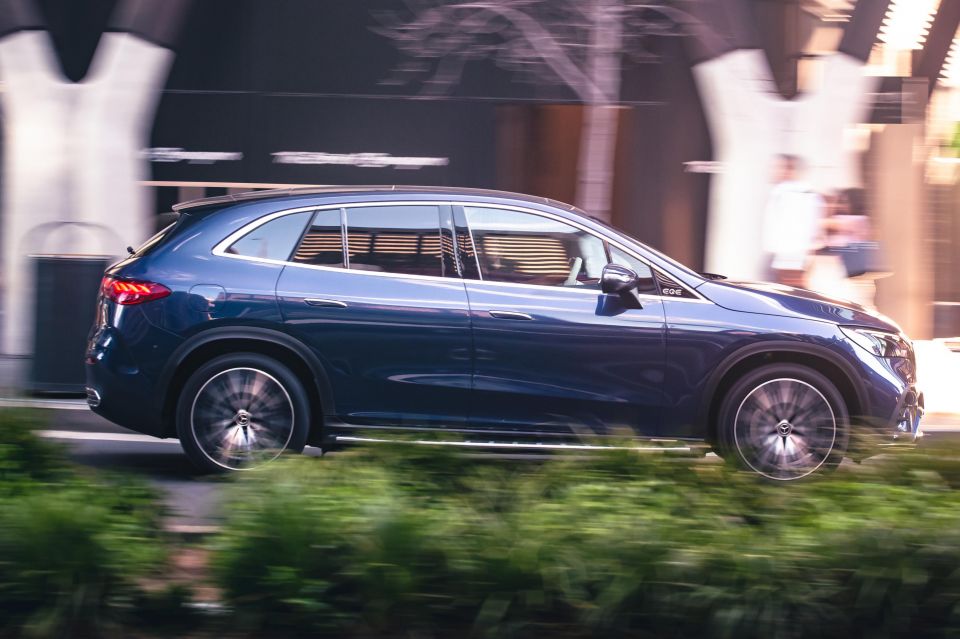
While we didn’t do instrumented testing of stopping distances, we did find stopping power to be unexceptional and found the brake pedal lacks feel.
There’s regenerative braking, as with other EVs, with three levels of intensity. However, there’s no dedicated one-pedal drive mode, and the highest level of recuperation won’t bring the vehicle to a complete stop – though, in an eerie touch, you’ll see the brake pedal moving.
In addition to flashing blue or red when you change the cabin temperature (useless), the ambient lighting will also flash for safety reasons, for example if you cross a lane marking (clever!)
The lane-keep assist works well at keeping you within your lane, and being steering-based it’s less alarming than the brake-based systems found in some Benzes.
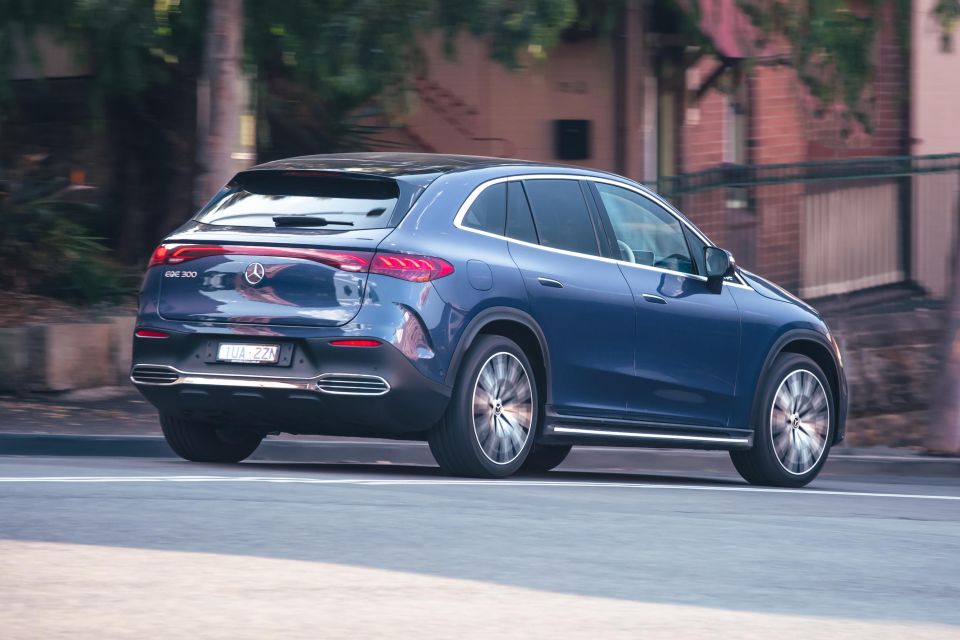
The EQ menu on the touchscreen is handy, displaying a number of different ways you can maximise range and how many kilometres they’ll net you. For example, it will display how many extra kilometres of range you’ll get if you change your climate control settings.
Less useful is the traffic light view, which displays camera footage from the front of the car whenever you come to a stop. Perhaps this is useful if you’ve pulled up to a very specific type of intersection with traffic lights that you can’t see through your windscreen. For the most part it was just distracting.
There’s an off-road menu, which gives you a transparent chassis view as well as readouts of where power is being distributed.
Speaking of cameras, the surround-view camera setup in the EQE SUV is superb and features a 3D view of the vehicle which you can swipe around.
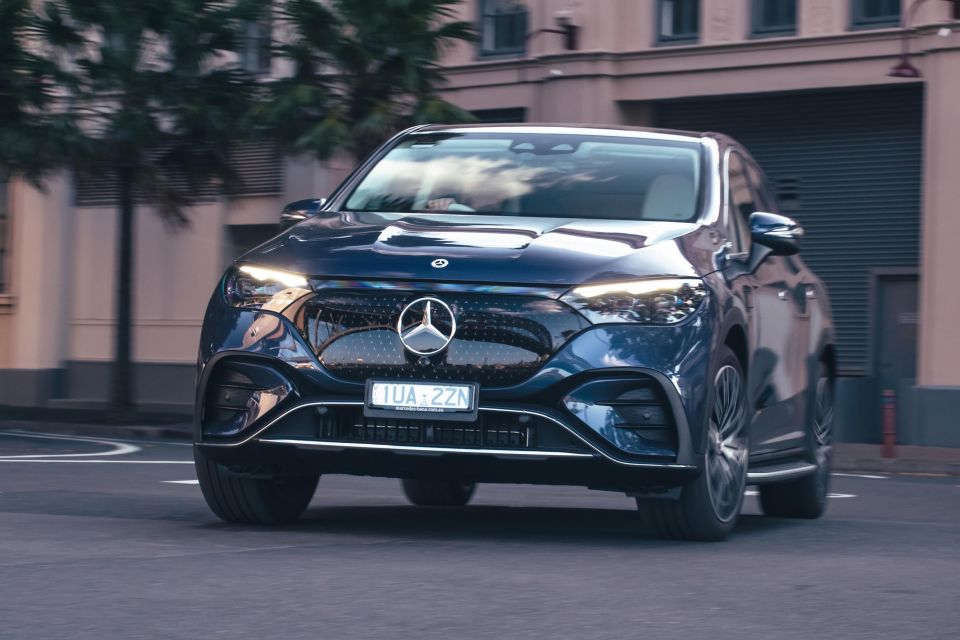
The Digital Light LED headlights are also excellent, moving with the steering wheel and casting ample illumination on the road ahead without dazzling oncoming motorists.
We didn’t get to try out the novel spotlight function, however, which can identify and illuminate pedestrians.
The EQE 350 SUV doesn’t add much over the entry-level model.
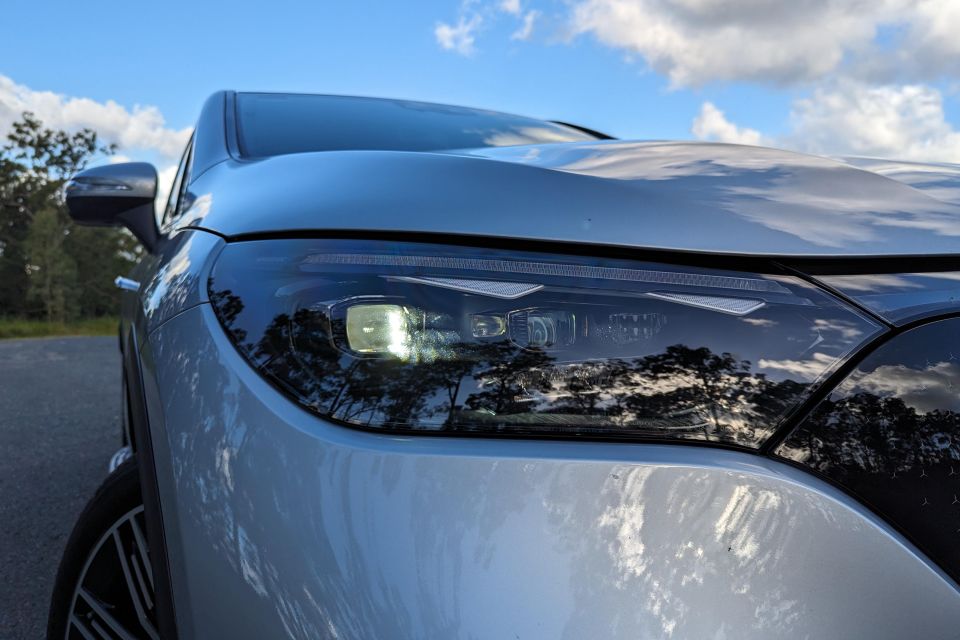

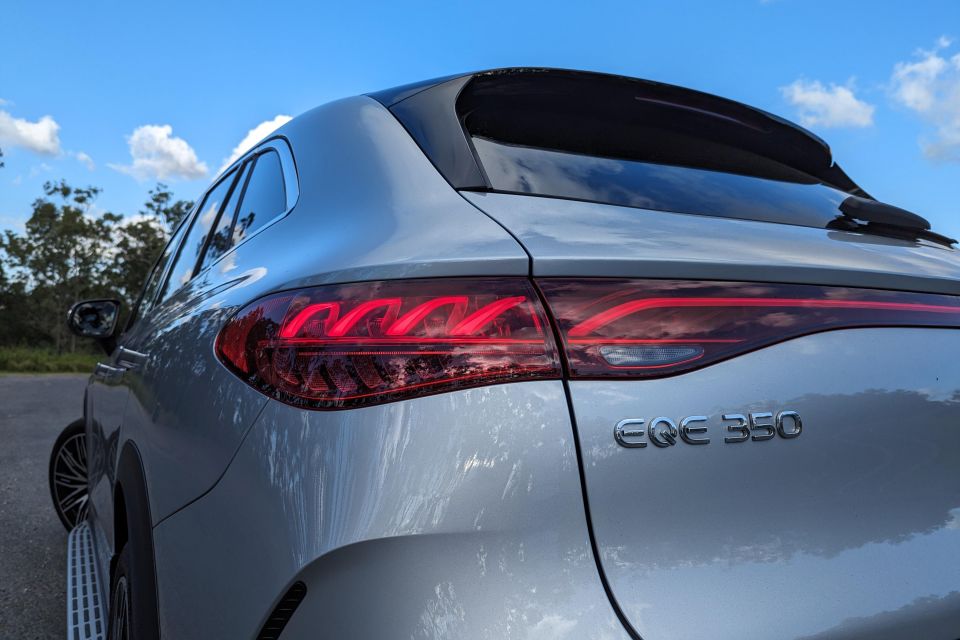
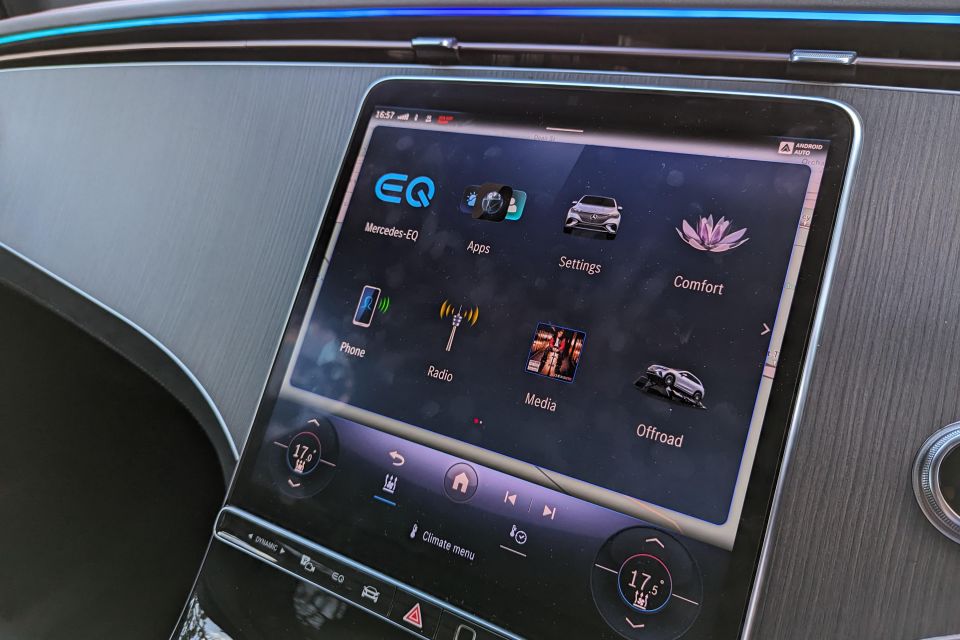
EQE 300 SUV highlights:
EQE 350 4MATIC SUV adds:
AMG EQE 53 4MATIC+ SUV adds:
The Mercedes-Benz EQE SUV has a five-star ANCAP safety rating, based on testing conducted by Euro NCAP in 2023.
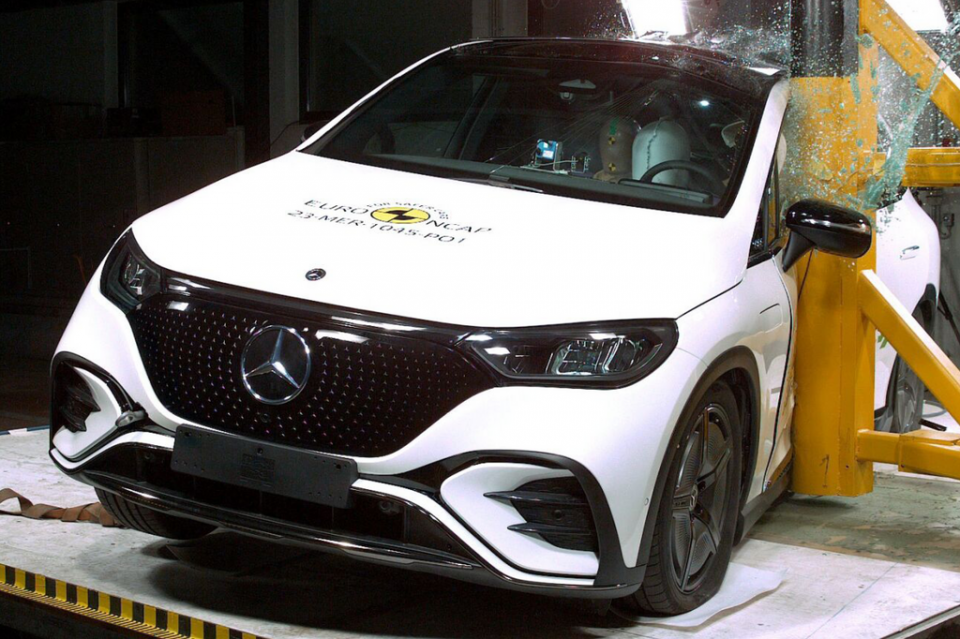
It received an adult occupant protection rating of 87 per cent, a child occupant protection rating of 92 per cent, a vulnerable road user protection rating of 80 per cent, and a safety assist rating of 86 per cent.
Standard safety equipment includes:
The EQE SUV is backed by a five-year, unlimited-kilometre vehicle warranty, plus a 10-year, 250,000km battery warranty.
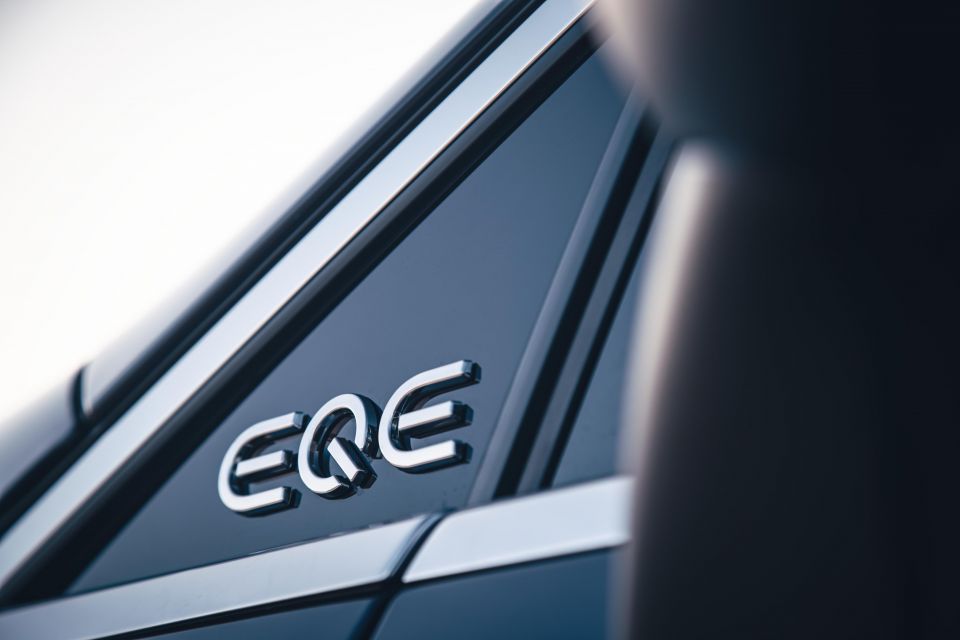
Servicing is required every 12 months or 25,000km, whichever comes first. Mercedes-Benz offers three-, four- and five-year service plans, priced at $2240, $3525 and $4085, respectively.
While those are at least $1500 cheaper than a combustion-powered GLE’s plans, they’re still on the pricey side for an EV. Audi offers six years of free servicing with its Q8 e-tron, while even an iX’s six-year plan costs only $3075.
There’s a lot of competition in this part of the EV market now, with all of the establishment brands wanting a piece of the pie – and most making a pretty convincing argument.
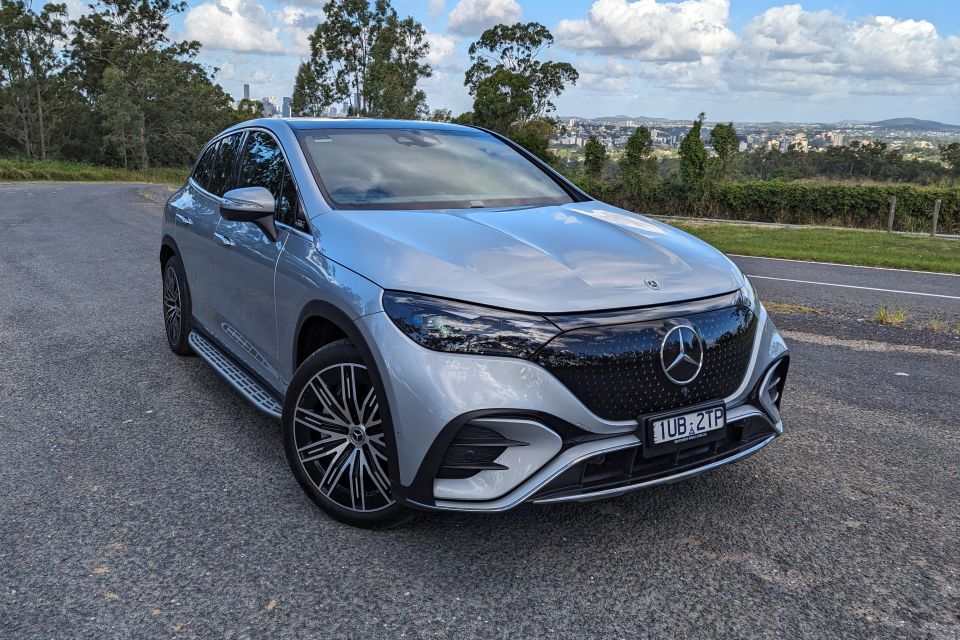
The Audi Q8 e-tron offers a much more conventional look inside and out, but it’s around $10,000 more. That’s too much to be offset by its superior after-sales package.
The BMW iX also offers a polarising exterior and a distinctive interior, and in all-wheel drive xDrive40 Sport guise it’s a cool $8000 less than the EQE 350 SUV – and that’s before any haggling. It’s also similarly comfortable.
Unless you need all-wheel drive, stepping down to the EQE 300 SUV and pocketing the $10k is a wise choice. You may lose 35kW and a second to 100km/h, but you still have all the attributes that make this luxury SUV endearing.
These include a glitzy (if imperfect) cabin, stellar technology and a plush ride. It may be a strange-looking creature, but it has plenty of charm.

Click the images for the full gallery
MORE: Buy a Mercedes-Benz EQE SUV MORE: Everything Mercedes-Benz EQE SUV
Where expert car reviews meet expert car buying – CarExpert gives you trusted advice, personalised service and real savings on your next new car.
William Stopford is an automotive journalist based in Brisbane, Australia. William is a Business/Journalism graduate from the Queensland University of Technology who loves to travel, briefly lived in the US, and has a particular interest in the American car industry.


CarExpert.com.au
4 Days Ago
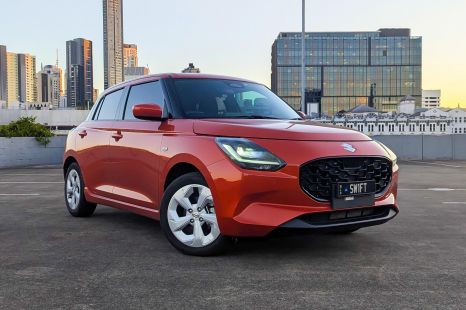

William Stopford
3 Days Ago
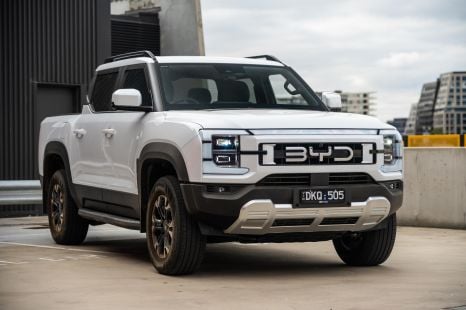

Max Davies
2 Days Ago
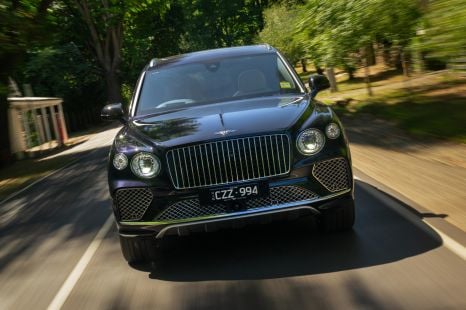

Josh Nevett
1 Day Ago
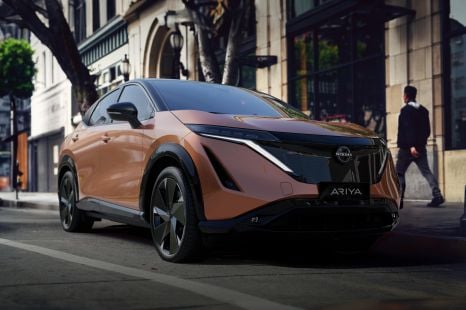

William Stopford
18 Hours Ago
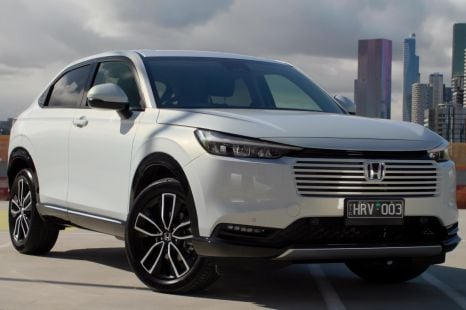

Elle Baillieu
17 Hours Ago